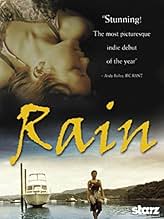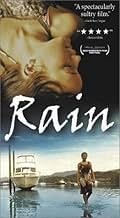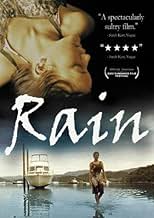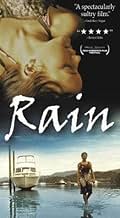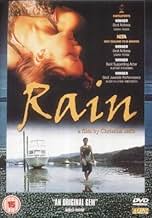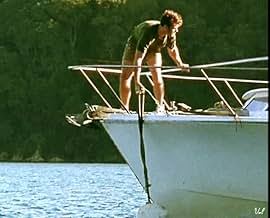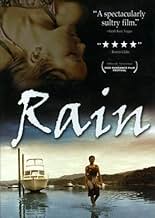IMDb RATING
6.8/10
1.7K
YOUR RATING
Whilst on a family vacation on the Mahurangi Peninsula in New Zealand, 13-year-old Janey begins to realize that her parents' marriage is on the rocks.Whilst on a family vacation on the Mahurangi Peninsula in New Zealand, 13-year-old Janey begins to realize that her parents' marriage is on the rocks.Whilst on a family vacation on the Mahurangi Peninsula in New Zealand, 13-year-old Janey begins to realize that her parents' marriage is on the rocks.
- Director
- Writers
- Stars
- Awards
- 5 wins & 6 nominations total
- Director
- Writers
- All cast & crew
- Production, box office & more at IMDbPro
Featured reviews
RAIN is set in New Zealand in the 1970's, but it could be anywhere, anytime. It's a sad tale about a family in the final stage of disintegration. The parents, teenage daughter and young son communicate only in occasional short bursts, so we learn about them from their gestures, actions and facial expressions.
Their summer holiday in a beach-front bach (holiday home) is a paradise gone sour, with the adults drowning their frustrations and disappointments in booze. Even the partying and midnight skinny-dipping isn't much fun seen through this movie's jaundiced lens. Casual, thoughtless flirtations finally lead to tragedy and the innocent suffer most.
The deceptively simple but intriguing story is open to various interpretations, and if you like small scale movies with an original take on life you should enjoy this movie. But don't expect a series of dramatic events, it's a quiet and slow-paced movie with convincing acting reinforced by a low-key sound-track.
Their summer holiday in a beach-front bach (holiday home) is a paradise gone sour, with the adults drowning their frustrations and disappointments in booze. Even the partying and midnight skinny-dipping isn't much fun seen through this movie's jaundiced lens. Casual, thoughtless flirtations finally lead to tragedy and the innocent suffer most.
The deceptively simple but intriguing story is open to various interpretations, and if you like small scale movies with an original take on life you should enjoy this movie. But don't expect a series of dramatic events, it's a quiet and slow-paced movie with convincing acting reinforced by a low-key sound-track.
I am a real sucker when it comes to movies that deal with subjects such as coming-of-age, first loves, families dividing, and independence in the younger generation. So it was no surprise to me that I found myself wrapped in the story of "Rain," a 2001 import from New Zealand about a 13-year-old girl watching her family slowly separate with the coming of a photographer, who takes a shine to her emotion-drained mother. As her mother and the photographer begin an extramarital affair, young Janey also struggles to teach her younger brother in the ways of the world, and combat the fact that she has an attraction toward this man herself.
"Rain" is played with a straight face, but this is to its advantage. It is a nice little film about many subjects; some of which we can relate to, others we hope never to. The plot does not thicken or compound itself with complications and big, astronomical twists. For most of its running time, it's sort of mundane. It almost seems like a Yasujiro Ozu film with a constantly moving camera. It presents life as it is without becoming melodramatic or hyperbolic and I think this is the reason why a lot of us can understand the position of Janey, who is very well-played by Alicia Fulford-Wierzbicki, and get involved in a story that is edited with gentle pacing.
Some of the directing is a little hampered (no surprise, since it was Christine Jeffs's debut) but is overcome by deliberately rich symbolism. There are symbols and graphic representations found all throughout this movie and a sharp-eyed person will be very appreciative toward them. Example: daughter wants to confront her mother about a touchy issue with a little hostility. Her brother is off to the side, blowing bubbles through his straw into his drink to simulate boiling water: a parallel to the brewing animosity between the two characters.
The movie is also rich with its details about the coming-of-age part of a person's life and this is what, I think, really drew me in. Janey is on-screen almost all of the time and we see her go through the rough parts of growing up. She experiences her first kiss, her first crush on an adult, her strives for independence from her parents brews, her desire to both instruct her younger brother and to get away from him, to stand on her own two feet, etc. We've all been there before. We don't get that many (compelling) coming-of-age stories these days and so a movie like "Rain" is worthy of appreciation.
Performances are very good. Alicia Fulford-Wierzbicki, most of the time, stays solid in her characters and expresses her emotions (many of them withheld) wonderfully. She's a very good actress. As her emotionally-drained, seemingly lifeless mother, Sarah Peirce is very good, representing her inner feelings remarkably well while keeping a straight, seemingly exanimate face. The same can be said of Alistair Browning as the father. There's great energy in the performance by Aaron Murphy as the young, highly adventurous and free-spirited brother and a solid performance from Marton Csokas, whom "Lord of the Rings" fans are sure to recognize. There's also a very good supporting performance from David Taylor as the boy down the beach with a crush on Janey. His part, though very small, also contributes to this very sweet little painting of a movie.
Warning: parents considering showing this movie to children might want to take into mind a brief, erotic prelude scene to lovemaking, and some brief flashes of male genitalia during a beach scene.
"Rain" is played with a straight face, but this is to its advantage. It is a nice little film about many subjects; some of which we can relate to, others we hope never to. The plot does not thicken or compound itself with complications and big, astronomical twists. For most of its running time, it's sort of mundane. It almost seems like a Yasujiro Ozu film with a constantly moving camera. It presents life as it is without becoming melodramatic or hyperbolic and I think this is the reason why a lot of us can understand the position of Janey, who is very well-played by Alicia Fulford-Wierzbicki, and get involved in a story that is edited with gentle pacing.
Some of the directing is a little hampered (no surprise, since it was Christine Jeffs's debut) but is overcome by deliberately rich symbolism. There are symbols and graphic representations found all throughout this movie and a sharp-eyed person will be very appreciative toward them. Example: daughter wants to confront her mother about a touchy issue with a little hostility. Her brother is off to the side, blowing bubbles through his straw into his drink to simulate boiling water: a parallel to the brewing animosity between the two characters.
The movie is also rich with its details about the coming-of-age part of a person's life and this is what, I think, really drew me in. Janey is on-screen almost all of the time and we see her go through the rough parts of growing up. She experiences her first kiss, her first crush on an adult, her strives for independence from her parents brews, her desire to both instruct her younger brother and to get away from him, to stand on her own two feet, etc. We've all been there before. We don't get that many (compelling) coming-of-age stories these days and so a movie like "Rain" is worthy of appreciation.
Performances are very good. Alicia Fulford-Wierzbicki, most of the time, stays solid in her characters and expresses her emotions (many of them withheld) wonderfully. She's a very good actress. As her emotionally-drained, seemingly lifeless mother, Sarah Peirce is very good, representing her inner feelings remarkably well while keeping a straight, seemingly exanimate face. The same can be said of Alistair Browning as the father. There's great energy in the performance by Aaron Murphy as the young, highly adventurous and free-spirited brother and a solid performance from Marton Csokas, whom "Lord of the Rings" fans are sure to recognize. There's also a very good supporting performance from David Taylor as the boy down the beach with a crush on Janey. His part, though very small, also contributes to this very sweet little painting of a movie.
Warning: parents considering showing this movie to children might want to take into mind a brief, erotic prelude scene to lovemaking, and some brief flashes of male genitalia during a beach scene.
This film was delicious to watch. Some of the cinematography was really striking, as were some of the cinematographic choices, such as the sparing use of very brief black-and-white shots. I also liked the depictions of children at play (one moment in particular: when Jim cavorts in the dimly lit front yard at dusk in semi-slow-mo in a dracula cape, in a sort of scene-change-sideshow-distraction, innocently echoing the ominous tone of the previous scene). The play really rang true, reminding me of my own interactions with my siblings. The relationship between the two children was endearing and a welcome relief from the other very draining relationships in the movie.
I spent most of the film wondering whether a particular event was going to happen, and I felt that the few moments after it did happen near the end were the best of the film, UP UNTIL something else happened that I felt was a little over the top. The former event brought together the relationships that Janey, the young protagonist, had with all of the other characters in such rich, complex, achingly painful ways, it really left me in awe. It was a very strange experience, then, to have the second, over the top event happen not a minute later. I really felt this last event was unnecessary, and it cut me off from fully appreciating the best moment of the film.
So, the first 94 minutes or so were really great, and the last three, while they did cut me off from my greatest moment of admiration, did not detract from the overall greatness of the film.
I spent most of the film wondering whether a particular event was going to happen, and I felt that the few moments after it did happen near the end were the best of the film, UP UNTIL something else happened that I felt was a little over the top. The former event brought together the relationships that Janey, the young protagonist, had with all of the other characters in such rich, complex, achingly painful ways, it really left me in awe. It was a very strange experience, then, to have the second, over the top event happen not a minute later. I really felt this last event was unnecessary, and it cut me off from fully appreciating the best moment of the film.
So, the first 94 minutes or so were really great, and the last three, while they did cut me off from my greatest moment of admiration, did not detract from the overall greatness of the film.
It does not actually rain in this movie, but there is a sullen, overcast feel to it. Usually family holidays are recalled with some affection the bad bits edited out. In this family's story from the 1970s there's not much that is pleasant to recall. Mum is drinking herself to oblivion and having an affair with a neighbour, Dad is not coping either, and the 13 year old daughter is confused and frightened by the goings on. Her little brother, a sunny kid, is not so affected. Early on, it is plain that some kind of tragedy is going to happen.
Apart from some of the flattened vowels, and the unremarkable coastline just north of Auckland this is a story that could be set anywhere amongst the aimless middle classes of western society the people who have what they need or more, but who have no higher ambition but to joylessly consume. In the wife's case this is unfortunately alcohol. Her daughter has reached puberty but has to cope on her own. (the local boys seem to be behind her in development anyway).
As the daughter, Alicia Fulford-Wierbicki puts in a fine performance, as does Sarah Pierce as the mother. The men are all pretty shapeless with Marton Csokas doing a glowering Russell Crowe number as the mother's lover.
It's a bleak story but well done.
Apart from some of the flattened vowels, and the unremarkable coastline just north of Auckland this is a story that could be set anywhere amongst the aimless middle classes of western society the people who have what they need or more, but who have no higher ambition but to joylessly consume. In the wife's case this is unfortunately alcohol. Her daughter has reached puberty but has to cope on her own. (the local boys seem to be behind her in development anyway).
As the daughter, Alicia Fulford-Wierbicki puts in a fine performance, as does Sarah Pierce as the mother. The men are all pretty shapeless with Marton Csokas doing a glowering Russell Crowe number as the mother's lover.
It's a bleak story but well done.
Rain is the type of New Zealand movie that New Zealanders love. Slice of Kiwiana presented with high art mixed with bleakness.
People have berated the double barreled ending as contrived but it is also symbolic. Janey comes of age through one event and is hit home that she can't go back through the other.
The acting is great. And the cinematography almost steals the show.
Kiwi batch life is presented in full force. A young girl's all too fast growing up because of the parents selfishness is presented with only a hint of sentimentality and emotional manipulation.
People have berated the double barreled ending as contrived but it is also symbolic. Janey comes of age through one event and is hit home that she can't go back through the other.
The acting is great. And the cinematography almost steals the show.
Kiwi batch life is presented in full force. A young girl's all too fast growing up because of the parents selfishness is presented with only a hint of sentimentality and emotional manipulation.
Did you know
- TriviaOf the picture's source 'Rain' (1994) novel, the film's director Christine Jeffs said: ''I really loved the sense of atmosphere and foreboding in the novel and also the reflection on childhood...The sense of transience in that relationships come and go and that the moment is precious''. The challenge for Jeffs was to recreate those elements in the medium of film. She added: ''I spent a long time trying to persuade other people that there was a film in there. A story about the detail of everyday life, that was worth translating to the screen.''
- GoofsAlthough this film is set in the year 1972, the partygoers at Ed and Kate's party are dancing to the Sherbert song "Howzat", which was not released until 1976.
- ConnectionsFeatured in Rain: Promo Reel (2003)
- SoundtracksBath/You Don't Know
Written by Neil Finn (as N. Finn)
Mushroom Music (Australia & New Zealand)
Roundhead Music administered by Wixen Music Publishing (USA & Canada)
EMI Music Publishing UK (rest of the world)
- How long is Rain?Powered by Alexa
Details
- Release date
- Country of origin
- Official sites
- Language
- Also known as
- Дождь
- Filming locations
- Rodney District, Auckland Region, New Zealand(location: Mahurangi Peninsula)
- Production companies
- See more company credits at IMDbPro
Box office
- Gross US & Canada
- $455,164
- Opening weekend US & Canada
- $15,222
- Apr 28, 2002
- Gross worldwide
- $492,661
- Runtime
- 1h 32m(92 min)
- Color
- Sound mix
- Aspect ratio
- 1.66 : 1
Contribute to this page
Suggest an edit or add missing content







